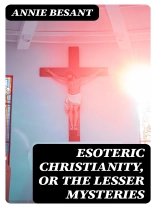In ‘Esoteric Christianity, or The Lesser Mysteries, ‘ Annie Besant explores the deeper spiritual meanings and hidden truths of Christian doctrine, offering a provocative interpretation that bridges Eastern and Western religious thought. Drawing from a rich tapestry of philosophies, including Theosophy and ancient mysticism, Besant employs a discourse that is both enlightening and contemplative, urging readers to transcend the superficial tenets of Christianity to grasp its more profound esoteric teachings. The book challenges conventional religious paradigms, positioning itself within the literary context of early 20th-century spiritual revivalism, where a quest for deeper truth was prevalent. Annie Besant was a prominent Theosophist, social reformer, and advocate for mental and spiritual awakening. Her lifelong journey through various ideologies—including atheism, social activism, and mysticism—shaped her views on religion, particularly Christianity, which she regarded as a foundational yet often misinterpreted spiritual path. Besant’s intellectual and spiritual pursuits led her to view the esoteric as a vital aspect of personal and collective transformation, culminating in the creation of this thought-provoking work. This book is highly recommended for those seeking to deepen their understanding of Christianity beyond its dogmatic boundaries. It provides readers with a unique framework for considering the interplay of spirituality, morality, and mystery within a familiar faith tradition. Whether you are a scholar of religion or a seeker on a spiritual path, Besant’s insights will provoke critical thought and inspire a richer comprehension of the sacred.
Despre autor
Annie Besant (1847–1933) was a versatile British writer, women’s rights activist, theosophist, and speaker who left an indelible mark on the intellectual and social landscape of the 19th and early 20th centuries. Born as Annie Wood, she gained prominence in various spheres, including politics, education, and religion. Besant’s foray into the world of writing and theosophy is punctuated by her seminal work, ‘Esoteric Christianity, or The Lesser Mysteries’, wherein she delves into the mystical aspects of Christianity, contending that religious truths lie beneath surface interpretations of scripture, accessible only to those who understand the esoteric symbols (Besant, 1901). Her literary style often combined a scholarly approach with an impassioned plea for spiritual and social reform, reflecting her deep commitment to theosophical principles and her advocacy for a more equitable society. As a leading figure in the Theosophical Society, Besant worked closely with other prominent theosophists like Helena Blavatsky, contributing to the expansion of Theosophical thought and literature. Her extensive body of work, which includes titles such as ‘The Ancient Wisdom’ and ‘Thought Forms’, among others, remains critical to the study of alternative spirituality and religion. Besant’s legacy as a revolutionary author is complemented by her tireless activism, notably her staunch support for Indian self-governance and her pivotal role in establishing the Central Hindu College in Benares, which later evolved into the esteemed Banaras Hindu University.












